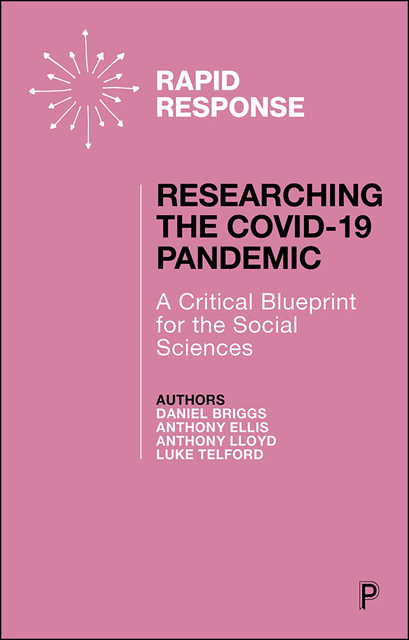Book contents
- Frontmatter
- Dedication
- Contents
- List of figures and tables
- Acknowledgements
- Foreword
- 1 Apocalypse then: The world pre-COVID-19 and the state of the social sciences
- 2 Viral Armageddon: The spread and impact of COVID-19
- 3 Apocalypse now: The (desk-based) scramble for knowledge
- 4 Studying the COVID-19 pandemic as it happens
- 5 Apocalyptic futures: An appeal to the social sciences
- Notes
- References
3 - Apocalypse now: The (desk-based) scramble for knowledge
Published online by Cambridge University Press: 15 April 2023
- Frontmatter
- Dedication
- Contents
- List of figures and tables
- Acknowledgements
- Foreword
- 1 Apocalypse then: The world pre-COVID-19 and the state of the social sciences
- 2 Viral Armageddon: The spread and impact of COVID-19
- 3 Apocalypse now: The (desk-based) scramble for knowledge
- 4 Studying the COVID-19 pandemic as it happens
- 5 Apocalyptic futures: An appeal to the social sciences
- Notes
- References
Summary
As the previous chapter outlined, the most significant ‘event’ of the 21st century has the potential to drastically change the political, economic and social coordinates of the world. While some scholarship has been erudite, linking the micro to the macro and speculating on what the future political economy will look like (for example: Matthewman and Huppatz, 2020; Primrose et al, 2020; Saad-Filho, 2020; Scambler, 2020; Sumonja, 2020), other social scientific work is often theoretically and/or empirically absent. Although space constrains how much literature we were able to review, in our critical analysis of some of the work devoted to capturing, understanding and conceptualising how COVID-19 is affecting us and changing society, we suggest they fall into one of the following categories or, in some cases, a combination of studies/commentaries which:
• Handwash social harm – endorse central ideological messaging associated with COVID-19 such as the lockdown and downplay the resultant social harm.
• Represent empirical curfews – fail to step outside their discipline, romanticise reality and impose deaptive theories like moral panic. These works lack depth in capturing people's experiential realities during the pandemic and are often empirically limited.
• Disinfect reality – do not place reality within its macro political-economic context and provide snapshot efforts to dissect social feeling/experience into measurable variables and graphs.
• Reflect an academic lockdown – are not studies but commentaries alluding to the glorification of the author's hobby or previous publications.
In this chapter, we critically review these studies and commentaries. We question the worth of these contributions against the backdrop of the kind of world we described in Chapter 1 – which is swiftly becoming something much worse (Chapter 2). Why? Well because some social scientists appear to have failed to ask some of the most pressing questions raised by the inception of COVID-19 and its political management. For example, from what we can see there has been a dearth of analyses that challenge the political management of the virus or the overwhelming political and media consensus on lockdowns. Given that the life trajectory, transmission potential and possible mutations of COVID-19 are partially shaped by political interventions, we find this troubling.
If the social sciences were in a healthy state, scholars would be unrelentingly critical of what has occurred since the onset of the COVID-19 pandemic.
- Type
- Chapter
- Information
- Researching the COVID-19 PandemicA Critical Blueprint for the Social Sciences, pp. 37 - 50Publisher: Bristol University PressFirst published in: 2023



